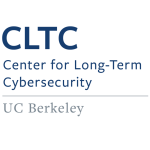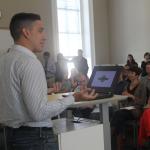
-
The Berkeley School of Information is a global bellwether in a world awash in information and data, boldly leading the way with education and fundamental research that translates into new knowledge, practices, policies, and solutions.
-
The School of Information offers four degrees:
The Master of Information Management and Systems (MIMS) program educates information professionals to provide leadership for an information-driven world.
The Master of Information and Data Science (MIDS) is an online degree preparing data science professionals to solve real-world problems. The 5th Year MIDS program is a streamlined path to a MIDS degree for Cal undergraduates.
The Master of Information and Cybersecurity (MICS) is an online degree preparing cybersecurity leaders for complex cybersecurity challenges.
Our Ph.D. in Information Science is a research program for next-generation scholars of the information age.
-
The School of Information's courses bridge the disciplines of information and computer science, design, social sciences, management, law, and policy. We welcome interest in our graduate-level Information classes from current UC Berkeley graduate and undergraduate students and community members. More information about signing up for classes.
-
Research by faculty members and doctoral students keeps the I School on the vanguard of contemporary information needs and solutions.
The I School is also home to several active centers and labs, including the Center for Long-Term Cybersecurity (CLTC), the Center for Technology, Society & Policy, and the BioSENSE Lab.
-
-
I School graduate students and alumni have expertise in data science, user experience design & research, product management, engineering, information policy, cybersecurity, and more — learn more about hiring I School students and alumni.
-
-
April 7, 2025, 12:00 pm – 2:00 pmApril 7, 2025, 2:40 pm – 4:30 pmApril 16, 2025, 4:00 pm – 6:30 pmApril 24, 2025, 5:00 pm – 7:30 pm
- About ►
-
Programs
►
- Explore Programs
- MIMS Program ►
- 5th Year MIDS Program ►
- MIDS Program ►
- MICS Program ►
- Ph.D. Program ►
- Graduate Certificate in Applied Data Science ►
- Cybersecurity Clinic ►
- Oxford-Berkeley Summer Doctoral Program
- Executive Fellowship in Applied Technology Policy
- Courses ►
- People ►
-
Research
►
- Explore Research
- Publications
- Centers & Labs
-
Research Areas
►
- Explore Research Areas
- Computer-mediated Communication
- Data Science
- Design
- Entrepreneurship
- Human-computer Interaction (HCI)
- Information Economics
- Information Organization
- Information Policy
- Information Retrieval & Search
- Information Visualization
- Law
- Privacy
- Security
- Social & Cultural Studies
- Technology for Developing Regions
- User Experience Research
- Careers ►
- News ►
- Events ►
- UC Berkeley
- Give
- Volunteer
- Contact Us
- Alumni
- Log in










































